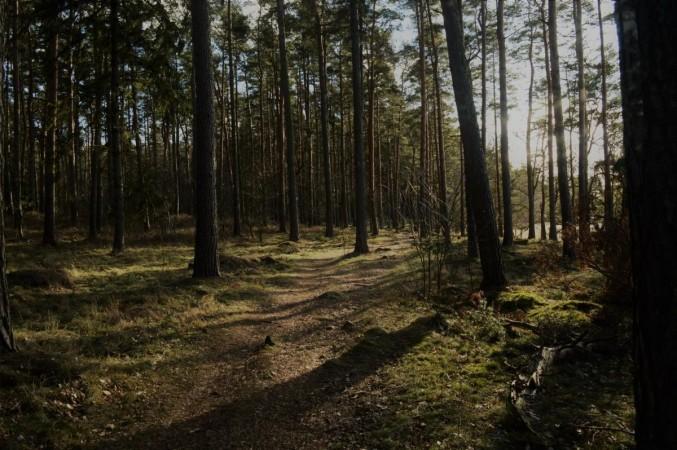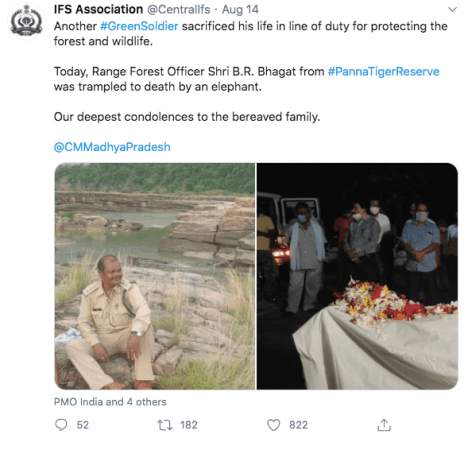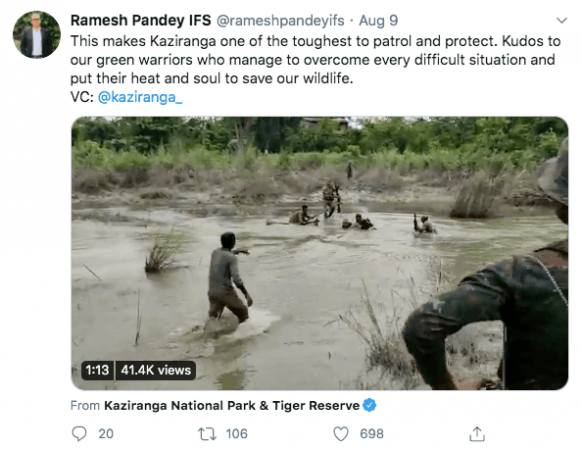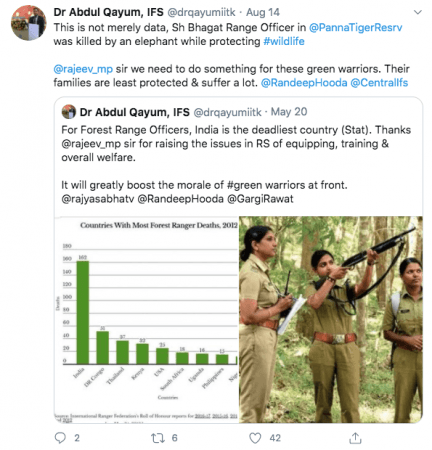
Working in forests is a hard job with unanticipated risks and high stakes battles on a daily basis. The brave souls who take up these jobs face great threats to their lives and yet, they rarely get their due.
India was declared the 'deadliest country' for forest rangers in the world according to stats from 2012-2017 reported by the International Ranger Federation, reporting a high number of cases of deaths among rangers.
The risk of being a forest ranger in India
Today climate change, wildlife and nature have become buzzwords. Buzzwords everybody wants to use and employ to sound 'woke'. However, rarely do those who use them, understand the gravity of those words. For those in uniform working in the Forest department as custodians of these paradises, it's their life they put at risk.
Often dubbed as 'unsung' heroes, forest rangers are rarely seen in the eye of the media, rarely do their stories make it to the headlines or the front page. Recently, in the Panna Tiger Reserve, a forest ranger was killed on duty by an elephant, in Madhya Pradesh.
The incident took place on Friday, and BR Bhagat lost his life. His family, however, has lost an earning member.

Recently on August 12th, an anti-poaching watcher died after being trampled by an elephant in the Courtallam forest range in Madurai, Tamil Nadu. These instances are just a brush on the surface.
Moreover, these are only two recent instances of deaths in the department from across the country. However, according to the International Ranger Federation's statistics, between 2012 and 2017 India accounted for 31% of forest ranger deaths in the world with the highest 162 deaths in the time period. Since then, more cases have been reported in the country adding to the toll.
The risks of working on the job as a forest ranger, that is on the frontline are plenty. They are exposed to the risks and threats every step of the way from poachers, illegal miners, harsh climates, animals and encroachers. Not to mention the infrastructural limitations of connectivity.
Speaking about the risk to IBTimes, IFS officer Dr Abdul Qayum said, "There is no road connectivity, there is no mobile internet connectivity anywhere, and the backup, there is no back up as such. If something happens, they are helpless. Most of the places where they work are remote areas."

The forest rangers are constantly exposed to tree smugglers and don't have the authority to shoot or protect themselves from armed smugglers and poachers. These concerns are outside of the daily hazards of working in the forest such as the climate or facing wildlife, such as elephants, tigers and so much more.
Compensation for forest ranger deaths
Most cases of deaths of forest ranger's deaths go unreported in India. In 2020, Rajeev Chandrasekhar, Member of Parliament in the Rajya Sabha raised the issues faced among forest rangers in the session. However, while policymakers are still debating the idea of ex-gratia and sufficient compensation, while rangers continue to be at risk.
'Green warriors' as they are called have limited options, and often have families depending on them for sustenance. The battles forest rangers face are battles, the common man can hardly fathom. While some moves have been made to report deaths and there are standard compensation packages given to the families of the rangers.

In January, Karnataka's state government raised the compensation for human deaths caused by wild animals from Rs 5 Lakhs to 7.5 lakhs. In an order effective on June 11th the compensation for forest personnel was hiked from Rs 20 to 30 lakhs in Karnataka. However, for personnel with permanent disabilities and serious injuries receive low compensation in the state of Rs 10 lakhs and 2 lakhs respectively.
It's not just compensation upon death, but the question of looking after them and giving them recognition during their work. According to a 2018 report by IndiaSpend, WWF and Wildlife Trust of India along with certain national parks do provide medical and health insurance to rangers, however, at a 'pan-India' level we still lack policies that provide coverage to the frontline staff in forests.
While a standardized model may not apply well in these circumstances because the conditions they work under are different and severe. Similarly, states have their own policies when it comes to compensation. On the matter of compensation, "There are some standard packages. There needs to be a higher rate of compensation for those working in really harsh conditions." Dr Abdul Qayoom tells us. For this, a policy framework is needed, sooner rather than later.
We often harp on wildlife conservation, and demand about the tiger population and poaching in the country. However, there are those who are working thanklessly to make these goals a reality, and they deserve acknowledgment.








